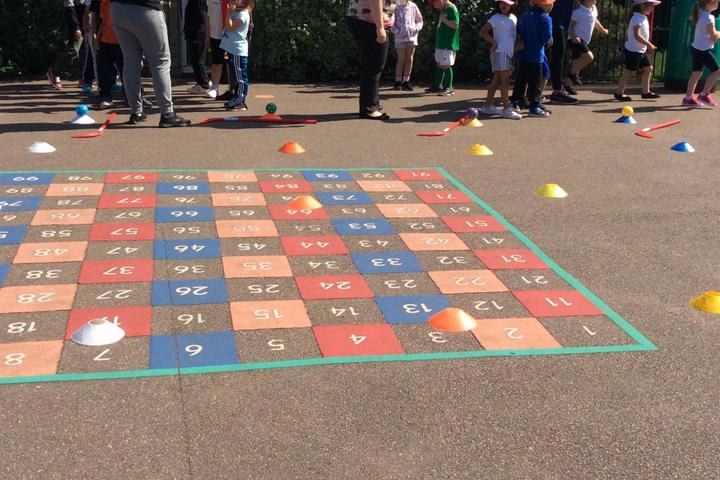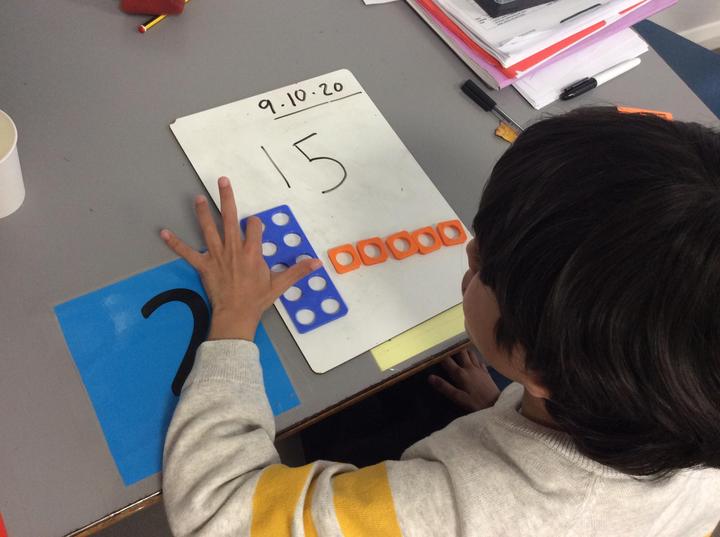Mathematics


The 2014 National Curriculum states that ‘Mathematics is a creative and highly interconnected discipline that has been developed over centuries, providing the solution to some of history’s most intriguing problems. It is essential to everyday life, critical to science, technology and engineering, and necessary for financial literacy and most forms of employment. A high-quality mathematics education therefore provides a foundation for understanding the world, the ability to reason mathematically, an appreciation of the beauty and power of Mathematics, and a sense of enjoyment and curiosity about the subject.’
Intent
The National Curriculum for Mathematics aims to ensure that all pupils:
· Become fluent in the fundamentals of Mathematics, including through varied and frequent practise with increasingly complex problems over time, so that pupils develop conceptual understanding and the ability to recall and apply knowledge rapidly and accurately.
· Reason mathematically by following a line of enquiry, conjecturing relationships and generalisations, and developing an argument.
· Can solve problems by applying their mathematics to a variety of routine and non-routine problems with increasing sophistication, including breaking down problems into a series of simpler steps and persevering in seeking solutions at Hillborough Infant and Nursery.
In line with the expectations of the National Curriculum, we expect that the majority of pupils will move through the Maths Curriculum at broadly the same pace. We do this through Quality First Teaching and by early identification and intervention for pupils who require additional support to succeed. We also identify those children who flourish in Maths and offer additional challenges and opportunities to deepen their understanding of the subject.
We aim to provide the children with a broad and varied experience of Maths, ensuring strong links throughout the taught curriculum and seamless progression through the year groups. In the EYFS, children’s achievements are on-going and are assessed against the Early Learning Goals.
We make judgements about the children’s mathematical attainment in relation to age related expectations as set out in the 2014 National Curriculum. Statutory assessments take place at the end of Year 2. Our Calculation Policy provides further detail on how we teach for progression across the school and aims to provide guidance on teaching methodology used throughout the school. Further information on how we help children progress on a day to day basis can be found in our Marking and Feedback Policy.
In addition, Assessment for Learning is well established throughout the school and the use of questioning, observation and marking will continue to be key parts of formative assessment as well as termly summative testing which helps inform teacher assessments.
Finally, it is important for children to use correct mathematical vocabulary and have an understanding of what these terms mean. We have a vocabulary list that breaks down expected vocabulary into year groups.
Implementation
Our use of practical and electronic resources allow us to implement the intent of our Maths Curriculum, and enable children to better use models and images to support learning in each area. We support children’s learning through ‘Concrete – Pictorial – Abstract’ approach, to ensure that children develop a deeper understanding of what they are learning. Children are familiar with these and are able to access them independently where needed, to also support learning in different contexts. Children are given opportunities to reason and solve problems regularly in all areas of mathematics; learning is varied and allows for deep and secure understanding.
All children when introduced to a new concept for the first time are encouraged to physically represent mathematical concepts. Objects and pictures are used to demonstrate and visualise abstract ideas, alongside numbers and symbols. Throughout Hillborough Infant and Nursery, you will see these three methods being used:
Concrete – children have the opportunity to use concrete objects and manipulatives to help them understand and explain what they are doing.
Pictorial – children then build on this concrete approach by using these pictorial representations, which can then be used to reason and solve problems.
Abstract – with the foundations firmly laid by using the concrete and pictorial methods the children can move onto an abstract approach using numbers and key concepts with confidence.
Furthermore, within the EssentialMaths Scheme of Work from Herts for Learning, each National Curriculum objective is broken down into fluency, reasoning and problem solving. Our teachers also use learning challenges to teach for mastery - an approach to extend and deepen the understanding of pupils within each year group. A mastery curriculum promotes a deep, long-term, secure and adaptable understanding of the subject, so that children become fluent in calculations; possess a growing confidence to reason mathematically and hone their problem-solving skills.
Teachers implement the school’s agreed Calculation Policy for progression in written and mental calculations.
Assessments are carried out to help teachers to gather an understanding of their pupil’s existing understanding of topics. Formative assessment is also incredibly important at Hillborough Infant and Nursery, where we focus on challenge questions and analysis of learning, mini plenaries and discussion with peers.
Mathematical vocabulary is explicitly included in the school’s Calculation Policy, to ensure that there is a consistency of correct mathematical vocabulary being used across the school.
Children’s fluency is developed through practising key skills, repeating, reinforcing and revising. Children are given time to practice and perfect their calculation strategies, including having opportunities to make appropriate decisions when estimating, calculating and evaluating the effectiveness of their chosen methods. Investigative tasks are designed to allow pupils to follow lines of enquiry and develop their own ideas, justifying and proving their answers.
Children work both collaboratively and independently when solving problems, this promotes a ‘Growth Mindset’ approach to tackling problems, which requires them to persevere and develop resilience. Perseverance is one of our school’s values, and thus children are constantly reminded about the importance of perseverance when faced with a solving a problem in Maths.
Impact
The impact of our Mathematics Curriculum at Hillborough Infant and Nursery, ensures that our children, across all abilities, move through the curriculum at a similar pace. Our teachers are encouraged to use their professional judgement at all times, meaning that children are given sufficient time to learn and practise each area of Maths before they move on to learn about a different unit. This means that children are able to develop a deeper understanding of each area of Mathematics. At Hillborough Infant and Nursery, we tell our children that it is perfectly acceptable to be ‘wrong’ because the journey to finding an answer is most important.
Children are developing skills in being able to reason verbally, pictorially and in written form. Across the school, children are becoming more familiar with using STEM sentences to help them explain their reasoning, both through spoken and written forms of reasoning.
Through the careful moderation of planning, lessons and books, we can be sure that progress is made across all year groups. If progress is not being made, intervention support is immediate and steps are provided to ensure that all pupils achieve and make progress.
Summative Assessment takes place at the end of each term and children’s progress and attainment is discussed with senior leaders in pupil progress meetings. Formative Assessment takes place on a daily basis and teachers adjust planning accordingly to meet the needs of their class. The teaching of Mathematics is monitored by school leaders through the use of Learning Walks, Book Looks and Pupil Voice.
